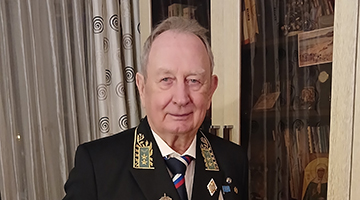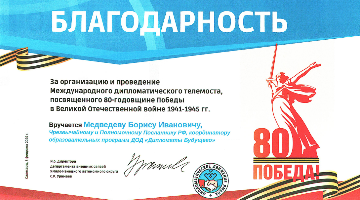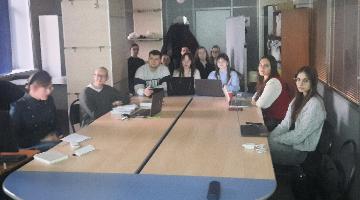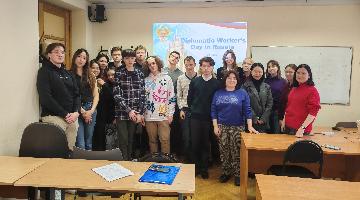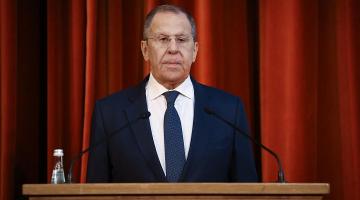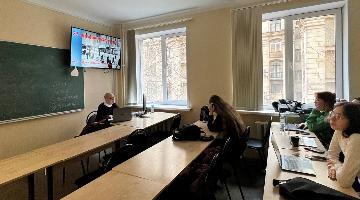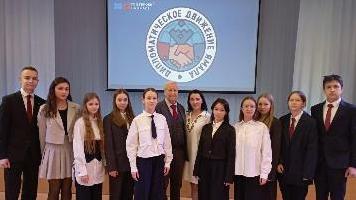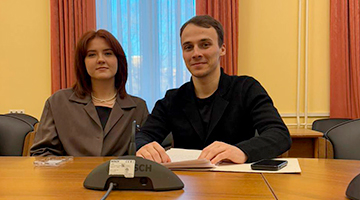6 - 13 мая 2024 г. в РГГУ прошли заседания студенческого научного семинара «Иноязычный коммуникативный дискурс»
В заседаниях семинара в начале мая принимали участие студенты факультета международных отношений, политологии и зарубежного регионоведения групп канд. пед. наук, доцента Татьяны Барановой и старшего преподавателя Елены Гурьяновой по направлению подготовки «Международные отношения», направленность «Ближневосточные исследования» (3 курс).
Основной задачей семинара является развитие у студентов навыков участия в индивидуальных и коллективных учебно-научных исследованиях, формирование представления о теории и практике научного дискурса; пробуждение интереса студентов к научному исследованию; стимулирование самообразования студентов; формирование форм научной коммуникации.
Участники семинара продолжили разрабатывать выбранную ими научную тематику,
сферой интересов студентов стали проблемы, находящиеся на стыке таких наук, как лингвистика, политология, психология, педагогика, история, также прошло обсуждение политического и новостного дискурса. Были представлены выступления, например, на следующие темы:
Historical roots of the Arabian Oil Industry
The Arab world has played a central role in shaping the contemporary global landscape. At the heart of this influence lies the Arab world's extraordinary relations with oil, a commodity whose impact goes beyond mere economic significance. For over a century, the Arab world has been inexorably tied to the global oil industry. The roots of this association can be traced back to the early 20th century. These discoveries marked the birth of the modern oil industry in the Arab world. Little did the world know that this emerging industry would evolve into a pivotal player on the global stage, influencing geopolitical power dynamics and essence of international relations. Therefore, to explore this topic, it is worth starting with how oil was found in the Arab countries and they became the richest in the entire world.
Taliban: history of emergence
The Taliban, a political movement in Afghanistan, emerged in the 1990s as a result of a combination of internal and external factors. The roots of the Taliban can be traced back to religious educational institutions, called madrassas, that appeared in Pakistani camps for Afghan refugees in the 1980s. These madrassas, influenced by Pakistan and Saudi Arabia, emphasized strict adherence to Islamic norms and built intolerance towards opponents. Dissatisfaction with the mujahideen government's actions in the 1990s led to the Taliban's emergence. The Pakistani authorities saw an opportunity to establish a stable regime in Afghanistan, stop interference from regional leaders, and tackle the narcotics problem. The United States also took an interest in the Taliban by pursuing their own interests. Initially, the Taliban exceeded expectations by disarming the mujahideen and imposing strict bans on drug production. However, as the Taliban seized new territories and discriminated against religious and national minorities, the international community, except for Pakistan, Saudi Arabia, and the UAE, did not recognize the Taliban regime as the legitimate government of Afghanistan.
Islamic Legal Modernism and Women’s Emancipation in Tunisia
This report will consider the influence of modern interpretations of Sharia on women's emancipation in Tunisia. Even though Tunisia is a Muslim country influenced by the Maliki school of thought, its social, cultural, and political conditions are favorable to women's emancipation efforts. This condition was created partly by the government's efforts to adopt Sharia's modern interpretation. Efforts to modernize Islamic law through state law have been going on for a long time and are consistent. Islamic legal modernism is envisaged by the Constitution, which guarantees women's equal rights, manifested in state law and policies.
Cooperation between the Russian Federation and Iran in the field of nuclear technologies: geopolitical and economic aspects (1992-2015)
The strategy of cooperation between Iran and Russia in the field of peaceful uses of atomic energy was based on the desire to develop relations that correspond to the fundamental interests of both countries. The first agreement between Russia and Iran was signed in 1992. According to this document, Russian specialists have pledged to help Iran complete the construction of an unfinished unit at the Bushehr nuclear power plant. The same decision was fixed in the contract dated January 8, 1995 during the visit of the Minister of Atomic Energy of the Russian Federation to Iran V. M. Mikhailov. Despite pressure from the United States, cooperation between Iran and Russia continued. Russian enterprises supplied equipment for the Bushehr NPP, which required significant efforts to integrate various types of equipment. The cost of the project was estimated at about $ 1 billion.
Представленная тематика вызвала большой интерес, участники семинара выразили удовлетворение дискуссиями, а также подтвердили намерение продолжить свои научные исследования. Семинар включен в официальный перечень научных мероприятий РГГУ 2024 г.


